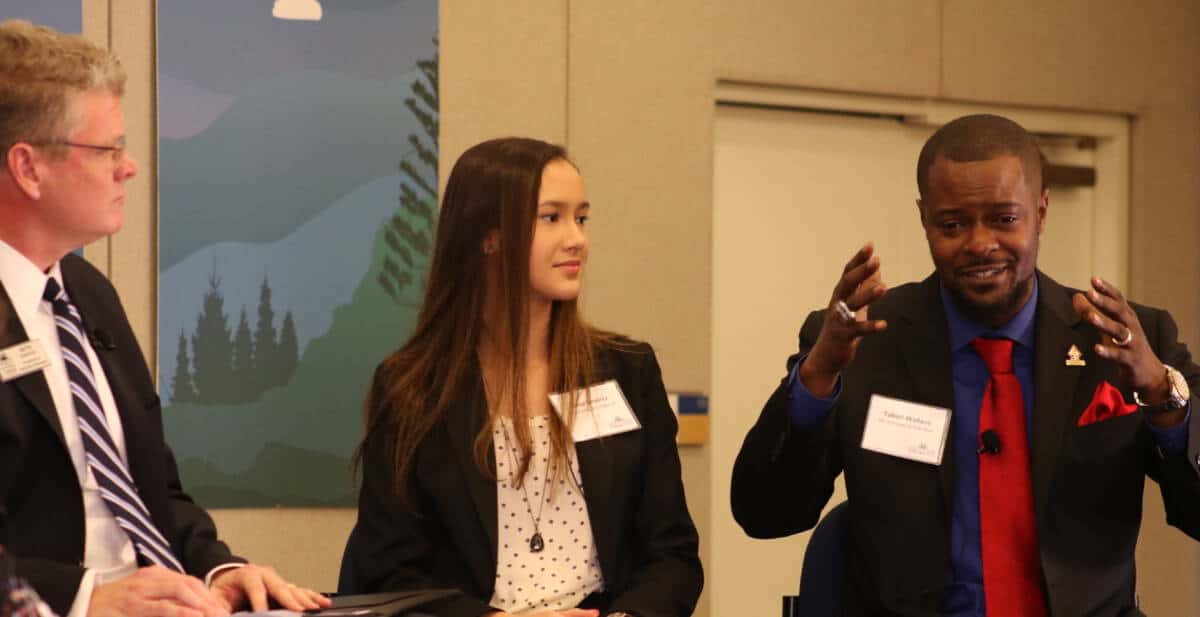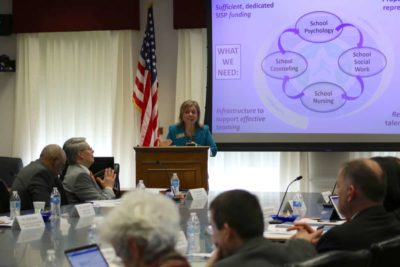As the legislature returns to session, education advocates are making their priorities clear. For the Public School Forum of North Carolina, that’s traditional public schools — their funding, their teachers and leaders, their diversity, their students.
“Public education benefits everybody in society, not only those who have kids in public schools,” said Lauren Fox, the Forum’s senior director of policy, Wednesday morning. “Having strong and equitable public schools leads to greater economic growth, improved public health, and lower levels of inequality. Public schools are one of the only institutions in society that bring people together across different racial, cultural, and socioeconomic groups, which is really more important than ever in our increasingly diverse society.”
For the fifth year, the Public School Forum revealed its 10 most important education issues to policymakers, politicians, and educators at its Eggs and Issues event in downtown Raleigh. Some were similar to issues from years prior, like adding accountability to choice programs, pushing for adequate funding, changing the A-F school grading system, and focusing on teacher recruitment and retainment.
Keith Poston, the forum’s president and executive director, said the issues were chosen based on forecasting what will arise in the coming year and which issues the organization thinks need more attention.
“It’s a combination really of the issues we think are going to be the most important issues but also ones that we think should be the most important issues,” Poston said. After the presentation of the issues, there was a taped panel for the Forum’s Education Matters show, with the following participants:
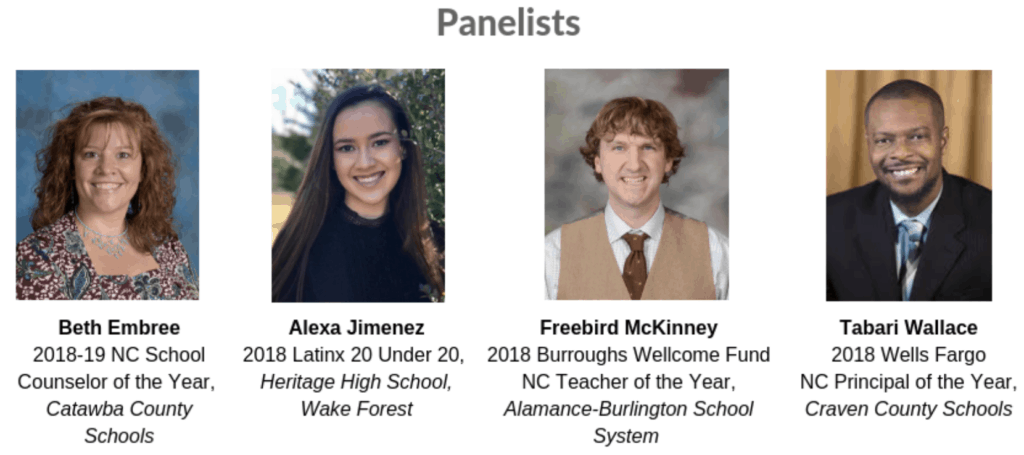
The top issue for the Forum this year is renewing the state’s “commitment to public schools for the public good.” Part of that, Fox said, is changing negative narratives around “failures,” of schools and students, especially when many are embedded in communities facing poverty and other barriers. Some issues were new this year, like targeting education needs in rural communities and emphasizing school safety.
Here are 2019’s 10 issues:
- Renew North Carolina’s Commitment to Public Schools for the Public Good
- Target Rural North Carolina’s Unique Education Challenges
- Directly Address Persistent Racial Inequities in North Carolina’s Schools
- Seize Historic Opportunity to Advance Adequacy and Equity in School Funding
- Recognize that Teacher Recruitment and Retention Starts with Professional Treatment
- Strengthen Charter School and Private School Voucher Transparency and Accountability
- Eliminate Stress and Stigma in Testing and Accountability Policy
- Start at the Top by Investing in School Leaders
- Thoughtfully and Strategically Invest In School Safety
- Focus on Whole Child, Whole Day
The following two pages of the Forum’s report give more details on how the Forum recommends each issue be addressed:
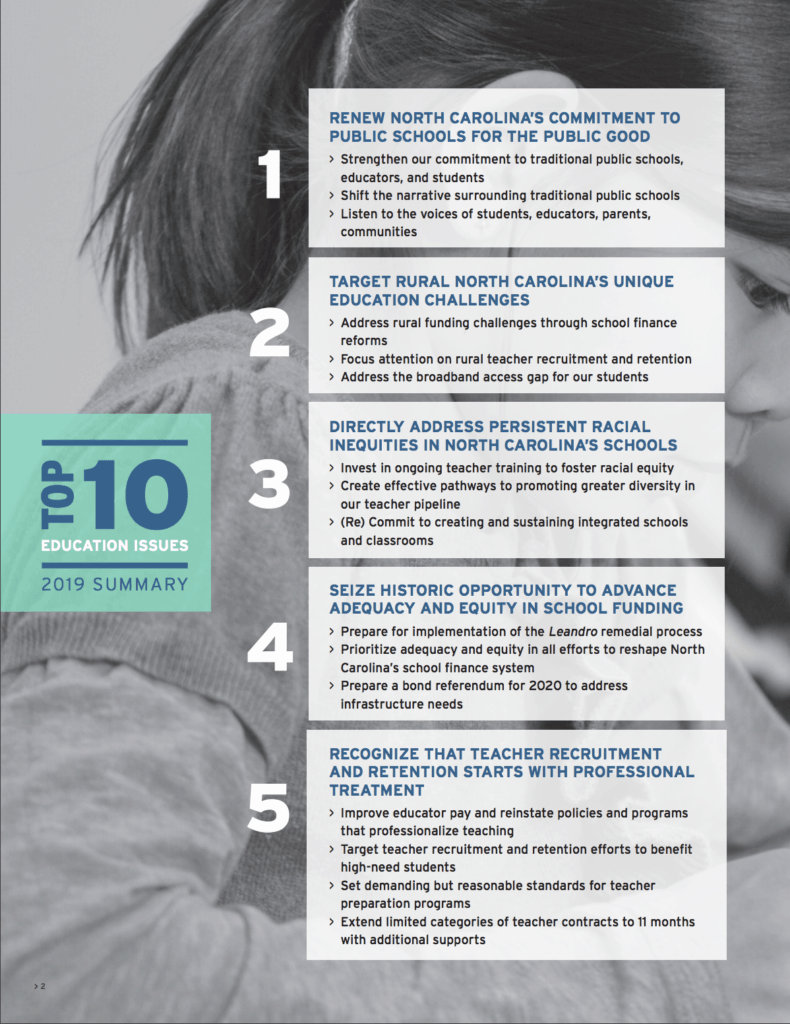
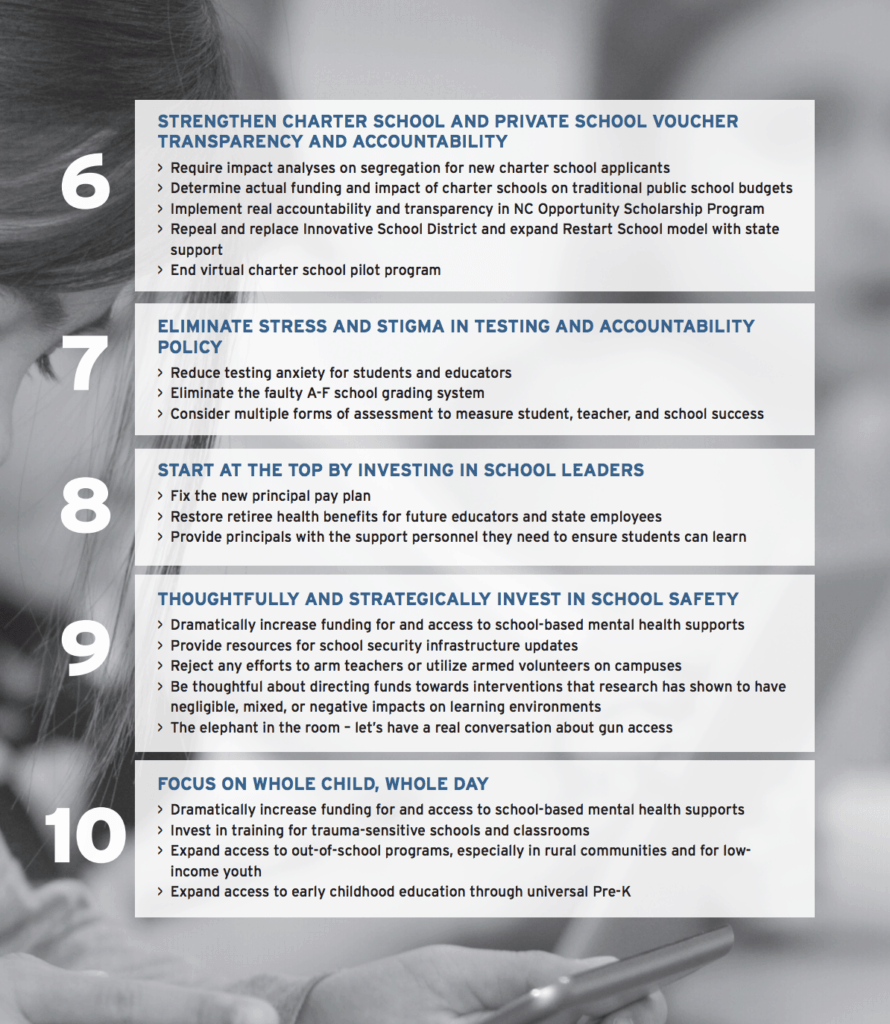
Find the full report below, which dives into each issue, why it was chosen, data around the problem, and specific solutions for 2019.
There are 568,000 students living in rural areas of the state, Poston said, which ranks North Carolina as the state with the second biggest rural population in the country, behind Texas.
“The fact is 87 of our 115 K-12 public school districts are located in rural counties,” he said. “Now, nowhere has been more affected by structural changes in the economy than rural North Carolina.”
Poston shared the story of his own family and community in Cumberland County, where textile jobs vanished and many were left wondering how to find stability and opportunity. The departure of manufacturing jobs across the state and country has raised questions on how the educational system can help to rebuild a workforce and revitalize communities.
“Now we have large swaths of our state that are in various stages of economic decline and that has an enormous impact on educational opportunities and outcomes,” Poston said. “The most visible ones are the ones that are driven by local resources.”
The base of teacher salaries is provided by state funding, but local districts also use supplements from local funding sources. Poston shared that urban districts have twice the average local supplements available when compared to rural districts. That’s an average of $4,200 compared to $2,100. He said urban districts on average spend 25 percent more per student than rural districts. And rural districts often have only half the number of college credit courses, like AP, to offer students a start on postsecondary attainment.
Poston said the funding structure the state uses to give rural and small counties supplemental dollars is not adequate and should be reassessed. He said recruitment and retainment, which is a struggle partly because of the disparity in salaries, needs to be a focus — suggesting boosts in pay for rural teachers. He upheld “grow your own” programs that find students willing to return to their communities to teach and help with schooling. Poston also said broadband access to rural homes needs attention because of the impact it has on opportunities for students. He said 95 percent of those without internet access in the state live in rural places. According to the FCC, that’s about 6.3 percent of the state population.
“We’ve actually done a great job, a nation-leading job, on connecting our schools,” he said. “But there still is gaps when students leave school, particularly in rural North Carolina. Sometimes this is called the homework gap.”
It has almost been a year since the Parkland, Florida high school shooting that killed 17 students and staff members and only about three months since a shooting at Butler High School in Charlotte left one student dead. Poston and Fox acknowledged these tragedies and presented the forum’s ninth issue, which is to “thoughtfully and strategically invest in school safety.”
“If students don’t feel safe in our schools, they can’t learn,” Fox said. She mentioned that, in response to school shootings, conversations have risen around “hardening schools,” and even providing teachers with guns.
“… We should understand that school safety comes from having a positive school climate that encourage social emotional learning and healthy relationships,” Fox said. “One of the best ways to address this … is to invest in school support staff to serve students’ mental health needs. North Carolina’s sorely lacking in this.”
Besides increasing funding for school support personnel, the Forum suggests addressing school infrastructure needs, rejecting efforts to arm teachers or use armed volunteers on school campuses, encouraging thoughtfulness when it comes to “hardening schools,” and having an open conversation about gun access.
The Education Matters show taped after the issues reveal featured a counselor, a teacher, a principal, and a student weighing in on their experiences related to some of the biggest education issues — racial inequity, testing, and the role of public schools in communities. The panel will be aired on Education Matters this weekend.
Burroughs Wellcome Fund’s 2018 NC Teacher of the Year Freebird McKinney opened by talking about his own experience as a Charlotte-Mecklenburg student joining hands with classmates and singing “We are the World” as a pre-requisite to recess.
“That’s what schools can do; they can create this sense of bond that transcends our classrooms and goes out into this greater community, but it can also give us the confidence to become who we are as a human being,” he said. “It can allow us self-actualization and self-realization…”
Alexa Jimenez, a student at Heritage High School in Wake Forest who was named one of 2018’s Latinx 20 Under 20 in North Carolina, said she appreciates the diversity her peers bring to the classroom. Jimenez also said meeting regularly with other students of color to network, study, and socialize helps her feel supported, especially since some of the diversity she sees in her school population does not reflect the composition of her Honors or AP courses.
“Your peers come from different households and different cultures, and I think that’s such a beautiful thing, that you get to see a different style of life than you would if you just, you know, you were homeschooled or maybe you went to a private school that didn’t have as great of diversity,” she said.
Wells Fargo’s 2018 Principal of the Year Tabari Wallace said he sees inequity in funding across the state as a school leader from a rural part of Craven County —and that teachers will reach into their own pockets to serve students when needed. “We can do so much more if we had more resources to do it with,” he said. When Poston shifted the conversation towards race in schools, Wallace said negative racial stereotypes have to be eliminated for students of color to have educational and life opportunities.
“You have to remove that subjectivity to allow people the opportunity to be able to provide for themselves … it’s the opportunity that’s the key that minorities face to be able to get ahead,” Wallace said.
Beth Embree, NC’s 2018-19 School Counselor of the Year from Catawba County Schools, touched on the social and emotional impacts of testing pressure on students. Students as young as eight years old are told they are failing year after year. “We were losing our kids by fifth grade on their investment in academics,” Embree said. Instead, her school has put an emphasis on growth. Both Wallace and McKinney also emphasized that growth needs to account for more in the state’s accountability system, which is currently based off of 80 percent achievement and 20 percent growth.
Poston also asked the panel how the teaching profession can make a come-back, with enrollment in education programs declining. McKinney said, as he has been traveling around the state talking to teachers, he has met committed teachers who want to reimagine their roles in communities and what the teaching profession means. Many want more training to fight implicit bias and address adverse childhood experiences and trauma their students face, he said.
“I see teachers really wanting and craving that next level of professional development to really serve the needs of our kids and to build better relationships out in their communities.”
